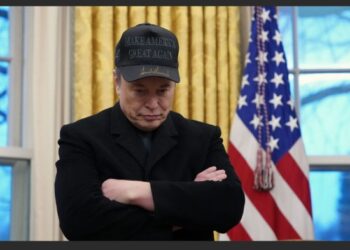Introduction: The Crisis Within U.S. Intelligence Agencies
In a Thrusday WarRoom conversation between Steve Bannon and Ezra Cohen, critical concerns were raised about the deeply entrenched problems within U.S. intelligence agencies, particularly the FBI and CIA. These institutions have been expanding and growing in power since 9/11, but according to Cohen, their effectiveness has drastically declined. Rather than enhancing national security, they have become a growing threat to American civil liberties, while failing to address critical security threats like terrorism.
See this quick snippet to set the tone:
Ezra Cohen On Intel Failures In Recent Attacks: Separate Law Enforcement From Domestic Intelligence @EzraACohen pic.twitter.com/wfS2FIXXr7
— Bannon’s WarRoom (@Bannons_WarRoom) January 2, 2025
The Deep State’s Grip on Law Enforcement and Intelligence
Cohen’s analysis of the current state of the FBI and CIA points to a disturbing reality. These agencies have not only failed to fulfill their core missions, but they have also become overly involved in matters that go beyond their scope. Instead of focusing solely on counterintelligence and counterterrorism, both organizations have expanded into realms that infringe on personal freedoms and divert resources from the most pressing threats.
Cohen’s concern is that the CIA and FBI have become "dug in” and institutionalized. He argues that these agencies have had decades to solidify their power, and they are now entrenched so deeply in the government that they are nearly impossible to reform without drastic action. What’s worse, they seem more focused on political agendas than their original purpose: protecting the American people.
This is why Bannon is sounding the alarm now:
Ezra Cohen On Intel Failures In Recent Attacks: Separate Law Enforcement From Domestic Intelligence @EzraACohen pic.twitter.com/wfS2FIXXr7
— Bannon’s WarRoom (@Bannons_WarRoom) January 2, 2025
The Urgent Need for Reform: A Radical Overhaul
To truly address the issues within the intelligence community, Cohen proposes a bold solution: a radical separation of law enforcement from intelligence operations. He believes that federal law enforcement should focus exclusively on enforcing the law, while intelligence agencies should prioritize gathering and analyzing intelligence on external threats. By decoupling the two, Cohen argues, each function will be more effective and focused on its core mission.
Cohen suggests that on day one of a new administration, the Attorney General and Secretary of Homeland Security should meet with the FBI Director to reassess the agency’s priorities. Together, they should identify the "essential missions” of the FBI, specifically counterintelligence and counterterrorism, and strip away any extraneous responsibilities that divert attention from these critical goals.
Why Separation is Crucial: Protecting Civil Liberties and National Security
Cohen’s call for separating law enforcement and intelligence is rooted in a fundamental belief that the current overlap between the two has compromised both functions. In recent years, the FBI has been caught up in political investigations and activities unrelated to its core mission. Meanwhile, the CIA’s expansive reach has increasingly intruded on civil liberties, leading to widespread concerns about surveillance and overreach.
By splitting these agencies, the hope is to refocus their efforts on protecting Americans from real threats, rather than engaging in domestic surveillance or politically motivated actions. As Cohen points out, there is no reason why an intelligence agency should also serve as a law enforcement body. The dual role often leads to conflicts of interest and inefficient use of resources. Separating these functions will not only improve national security but will also restore trust in these institutions, which have been severely eroded over the years.
The Consequences of Inaction: A Growing Threat to Democracy
Cohen and Bannon also discussed the failure of past leadership in handling these issues. They pointed out that many individuals responsible for intelligence abuses have been rewarded with promotions instead of facing accountability. The lack of action has allowed the intelligence community to become more powerful and more intrusive. As Cohen warns, the longer these agencies remain unchecked, the more entrenched they will become, further eroding civil liberties and weakening national security.
The example of the CIA’s role in the impeachment of President Trump is a prime illustration of how intelligence agencies can overstep their boundaries and undermine democracy. Cohen and Bannon argue that these agencies have become a tool for political power plays rather than a force for good.
Conclusion: Time for a New Approach
Cohen’s solution is straightforward: separate law enforcement from intelligence operations. This will require strong leadership and a willingness to take bold action. As Cohen puts it, reforming these agencies requires using a "blowtorch” to cut through the corruption and inefficiency that has taken root in the FBI and CIA. The stakes are high. Failure to reform these agencies will only allow them to continue their overreach and undermine the principles of democracy they are meant to protect.
In the end, separating law enforcement from intelligence isn’t just an option — it’s necessary to safeguard America’s future.

![Bannon’s WarRoom, Show Clip Roundup 10/17/2024 [PM]](https://warroom.org/wp-content/uploads/2024/10/GQ-06-Bannon-061517-350x250.webp)



![Bannon’s WarRoom, Show Clip Roundup 11/7/2024 [AM]](https://warroom.org/wp-content/uploads/2024/11/WarRoom-Logo-75x75.jpg)